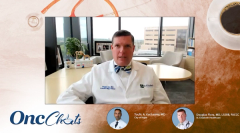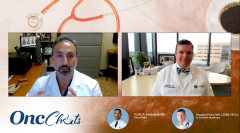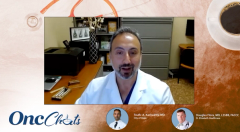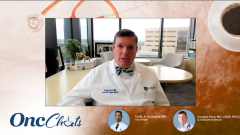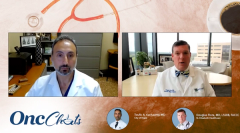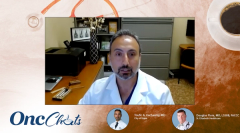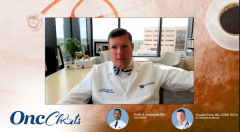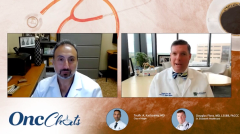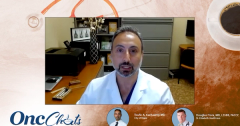
Assessing the Promise of AI in Oncology: Matching Patients With Clinical Trials
In this eighth episode of OncChats: Assessing the Promise of AI in Oncology, Toufic A. Kachaamy, MD, and Douglas Flora, MD, LSSBB, FACCC, explain how artificial intelligence tools are being developed to match the right patient to the right drug on the right clinical trial.
Episodes in this series

In this eighth episode of OncChats: Assessing the Promise of AI in Oncology, Toufic A. Kachaamy, MD, and Douglas Flora, MD, LSSBB, FACCC, explain how artificial intelligence (AI) tools are being developed to match the right patient to the right drug on the right clinical trial.
Kachaamy: Now, one area I wanted us to also touch on was linking patients to clinical trials. I know a lot of work has been done in that area, a lot of it using natural language processing and AI algorithms. Where are we on that, and do you see that solving some of the problems [we're seeing?] There are so many clinical trials, and so many patients are qualified [for them], but [sometimes] they never meet.
Flora: Yeah, gosh. That’s the Holy Grail for me. I’m a researcher. My brother runs oncology research here, and we are meeting with companies almost weekly right now, companies like Massive Bio, that have really built an amazing template to scrape data and identify those patients and screen for us so that we don’t have 12 [people] going through every new patient’s chart every day, or cherry picking [patients] out of tumor boards and hoping that we capture [the right ones. Tools are being] built for that, [ones that say,] “Let’s take a look at the electronic medical record for this new [patient with] breast cancer,” and it will check all the eligibility criteria and match the patient with a trial, hopefully, across regions—not just across hospital systems. I have great enthusiasm for that. It’s certainly a tool that I think a lot of us in the decision-making part of administrative oncology are very interested in seeing.
There are 3 or 4 companies that are a couple of years ahead, and in fact, some of [them] I specifically invited to be on our editorial board, because I think that’s critical for this journal, that we help make research more reachable to community patients. We got some head starts with some changes in clinical trial enrollment when the pandemic hit, the way we’re allowed to do site selection and things over Zoom and perhaps screen patients remotely. Those [changes] are [all] exciting to me, but I think AI finding the patient and matching them at the right time, [with the] right drug [at the] right dose is very exciting to me for clinical trials.
Kachaamy: That’s extremely interesting and promising. We’d love to see the outcomes sooner rather than later. One issue that I wanted to get your thoughts on is, that people say the real future is not this AI tool, or this AI tool, or this AI tool, but that the real future is combining all of these tools into one platform, whether that’s image recognition in radiology, histology analysis, or analyzing the entire chart for risk factors and coming up with a real answer. Do you see that as the Holy Grail? Is that where we're eventually heading?
Flora: I think you're getting at the 5- to 10-year goals, which is, as we become comfortable with this, and as we get larger and larger datasets to train these modules, that’s where the vast potential is. All the other stuff that we’ve talked about to this point is oncology 2023. However, we understand now that these tumors are so heterogeneous, and it’s not all genetic, sometimes it’s epigenetic, and sometimes it’s based on the distance to an academic treatment center, transportation difficulties, or navigation. And so, it is going to have to be a more holistic approach to apply these data; that’s where AI brings significant breakthroughs. It’s able to take datasets and include vast amounts of genomic data, transcriptomic data, phenomic genomic data, looking at things like the gut biome, and immunogenicity, and taking that all into one thing before it spits out a logical approach to plan for the patients.
It’s complex; it requires terabytes of information that human minds can’t process at that many levels with that level of complexity. As we get to this thing, 5 years from now or 10 years from now, where we’ve actually used this to unravel the protein structure or the epigenetics that led me to develop cancer and not you, then we may actually start to move into preventative stuff. Tools like CRISPR-Cas9 and other manipulations of DNA and RNA may be feasible because we’ve now identified the specific defect or what caused the defect that caused the cancers we’ve been chasing for millennia.
Check back on Monday for the final episode in the series.


